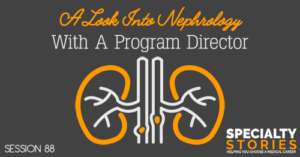Apple Podcasts | Google Podcasts

Session 88
Dr. Gilbert is a Nephrology Program Director at Tufts Medical Center. Today, we discuss traits that make a good Nephrologist and how to be competitive.
If you haven’t yet, please do check out all our other resources on the MedEd Media Network for more podcasts to help you along this journey towards becoming a physician.
[01:42] Interest in Nephrology
Gilbert initially thought he was going to be a primary care doctor. It wasn’t until his Junior year of residency when he got interested in Nephrology. He saw how it bridged his interests in primary care as well as the intellectual stimulation of the intensive care unit, transplant, and more.
[02:17] Types of Patients
Nephrology patients typically have multi-system organ disease. For instance, patients with kidney disease oftentimes have endocrinology diseases like diabetes. They can also have rheumatology diseases like lupus or vasculitis. Many times, they have co-morbid cardiovascular disease or pulmonary disease. Gilbert wasn’t looking to be a specialist that focused on one small area. Instead, he wanted to care for the totality of the patient. And being a kidney disease doctor allowed him to do that.
'They really touched on the breadth of what is medicine and that I find very attractive.'Click To Tweet[03:38] What Makes a Good Nephrologist
There are many bits and pieces to becoming a good nephrologist. There are different elements of medicine involved such as critical care and procedures. A lot of times, you have to deal with an individual’s goals. You must be interested in the holistic care of dialysis and transplant. You must have a solid grounding in the general aspects of medicine. You have to be organized, compassionate, and empathetic. You have to provide patient care on all levels.
If your focus is in research, you have to have a track record where you know how to post questions and frame answers. You have to be able to recognize the core issues that need to be explored.
'There's a whole host of different things that people can get out of a career in nephrology.'Click To TweetIf you’re interested in critical care, you want to organize and prioritize complicated care that ensures the needs of your patients are met. They look for people with particular skills that align with what it is you want to do.
You are usually evaluated based on your track record. They particularly look at past activities, performance in various roles during residency training, and organization affiliations. They look at your letters of recommendation, and a little bit goes to your board scores and academic performance. They look at everything to figure out whether they’re a good fit for a particular interest they have in nephrology.
Gilberts points out how applicants often focus on presenting what the programs are looking for. But they’re looking for niche training when you go into a residency program or a specific specialty. You no longer have to impress anybody. Rather, you need to find the training to provide you with the skills needed to succeed in the career you want. So be honest enough to come out and tell them what you want. If they welcome you, great. If they don’t you’re a good fit for them, then don’t train in a place that’s not aligned with your career goals.
At this point, applicants need to be self-aware of what they’re looking for out of their career. They have to accept that some programs are going to be able to provide that kind of training while others may not. That’s okay. The training is there to help you launch the career you want.
[08:25] Gilbert’s Thoughts on Poor Board Scores and Pass/Fail System
If you had red flags in your application but still want to take this journey, you need to be accountable. Acknowledge that you didn’t do well on an exam. Give them some background about what happened and it may be something they could look past. Be upfront about it. You can communicate this in the essay. Ideally, you can do this during the interview. But many times, the board scores might hold up your selection for an interview. So it has to be acknowledged before that. Some programs screen the applicants based on their board scores so those with poor board scores may not get the benefit of an application read. Gilbert believes this is unfortunate because the board scores don’t really reflect somebody’s potential to be an outstanding physician.
'I don't think that the board scores reflect somebody's potential to be an outstanding physician.' Click To TweetMoreover, Gilbert sees some benefits to a pass/fail system compared with a grading system. You usually use the former when the objective is to identify competency. At Tufts Medical School where he teaches, the first two years use the pass/fail system. You need to demonstrate a level of competency in your understanding of biochemistry and genetics. They’re looking for foundational material that will prepare students later to perform clinical duties at a high level. Once you get into the clinical setting, then they give grades because they could now see people who can excel in different areas.
Gilbert thinks there are challenges to making the boards pass/fail, which identifies a level of competency. There is data that people who do well on the boards are far more likely to pass their specialty boards. And those who have struggled on the boards have oftentimes struggled to pass their certifying examinations. So program directors are cautious about people who present risks of failing the certification boards.
[13:00] Types of Patients and Typical Day
Nephrology is a mixture of both outpatient and inpatient medicine. There is a lot of outpatient ambulatory clinic where they take care of patients with chronic kidney disease, chronic electrolyte disorders, hypotensive disorders, transplant patients, dialysis patients. Alternatively, nephrologists have a significant role in the inpatient hospital life setting. They take care of patients with kidney disease, kidney injury, and chronic kidney diseases who have been hospitalized. They also deal with electrolyte abnormalities, calcium and magnesium-related disorders, and acid-base disorders. There also get involved in the transplant setting where they adjust immuno-suppression. They manage infectious complications that occur in unique populations.
When they design their fellowship training program, they prepare individuals for the breadth of nephrology in terms of clinical practice. They have about 50% of their responsibilities aligned with inpatient medicine. This could be in the form of consult services, ICUs, and transplant services. While the other 50% of the effort is in the outpatient setting.
[15:10] Taking Calls and Performing Procedures
When patients come critically ill into the emergency department and require dialysis, fellows may need to come in and evaluate the patients. They assess their candidacy for dialysis and sometimes this can happen in the middle of the night. They may have to do procedures such as placing dialysis catheters occasionally in the middle of the night.
'There are times that fellows are performing home calls where they need to come to the hospital to evaluate very sick patients. But it doesn't happen very often.'Click To TweetIn terms of performing procedures, nephrologists usually replace non-tunneled catheters used for dialysis. They also attach dual lumen catheters that can take blood out and return into the circulation at the same time. Standard triple lumen catheters
are very large catheters so they require experience in the placement of these. Nephrologists and renal fellows develop the skills to place very large catheters into the body. They also learn to perform kidney biopsies in both the native kidneys and transplant kidneys to understand the underlying pathology of kidney disease. Nephrologists also perform invasive procedures.
There is a burgeoning field within Nephrology called interventional nephrology. Many people who enjoy doing surgeries may pursue a career in this area. Small surgeries can be performed as well as grafts, PD catheters, and vascular procedures such as angioplasty, stents, and fistulas.
'There are more and more procedures that are finding their way into nephrology.'Click To Tweet[19:15] When to Start Exploring Nephrology
For Gilbert, nephrology means a lot of different things to different people. As mentioned, he was initially interested in general medicine and family medicine. He wanted to be a physician in the community setting. He thought he’d do general medicine and then internal medicine at the end of his medical school training. He basically wanted to be the primary care doctor for a specialized group of patients. Then as he went on with his training, he was in a primary care track within an internal medicine residency. And as he explored a little bit more, he found it so interesting to do all the things a nephrologist does.
Gilbert advises students to learn your interests and learn yourself then you will quickly recognize the field that’s right for you. He knew what he wanted to do and when he finally heard what a nephrologist does, he knew it was the specialty for him. He knew nephrology would allow him to unite all of his different interests into a very satisfying and rewarding career.
'When you know yourself really well and then you recognize the field that can bring that all together, you're almost assured of finding a profession that you're never going to get bored of.'Click To Tweet[22:55] The Fellowship Training Path
Nephrology is a two-year accredited fellowship training program by the ACGME. Medical students need to do three years of internal medicine. Once completed, they can do a two-year nephrology fellowship. This is typically spent with one predominantly clinical year and a separate second year of individual exploration. This could cover areas like research, quality improvement, etc. Many programs offer a three-year training program. For instance, individuals want research training so they go through one predominantly clinical year and two years of research. After the two-year fellowship, they can do an additional year of subspecialty training in transplantation (1 year), glomerular fellowships (1 year), ESRD (end-stage renal disease)/dialysis care, procedural interventional nephrology (1 year). In total, fellowship training in nephrology is at least two years and this could go up to four or five years.
[24:43] Bias Against DOs and Demystifying Misconceptions
Gilbert explains that the training for DOs and MDs is very similar. There may be a difference in the structure of the curriculum of the two programs. But they have both DOs and MDs in their program. They feel very comfortable in either one of them.
Moreover, there are a lot of misconceptions around nephrology and they’re demystifying those in the residency program. These misconceptions basically push people away from the specialty that they work really hard to correct on the residency level.
Misconception #1: Nephrology is very, very hard, with very, very sick patients.
Talk about the differences between salt and water balance, hyponatremia vs. hypernatremia, and sodium overload vs sodium depletion, etc. The patients who develop acute kidney injury are oftentimes sick with multiorgan failure. But a lot of this is algorithmic. If you can keep the patients organized, there are ways these issues can be addressed.
'There's this conception that nephrology is just really hard and with really sick patients. But a lot of this is algorithmic.'Click To TweetMisconception #2: Nephrologists work really hard.
They come in early and stay a bit later. But they’re there for the patients. Their hours aren’t any longer than any other specialist. They don’t get called in any more than any other specialists. They’re just taking care of their patients.
Misconception #3. Nephrology is poorly reimbursed and nephrologists don’t get paid that much.
Nephrologists have dialysis, which is a money-maker. The reimbursement for dialysis is generous.
[28:10] The Future of Nephrology Training
Gilbert thinks that nephrology training is changing. The standard curriculum is evolving. In the future, nephrologists are going to really explore the wealth of where resources can be used. It could involve one year of core fundamental training.
There could also be more opportunities for the future nephrologist to subspecialize in areas they find particularly interesting. For instance, onconephrology addresses all the forms of kidney diseases associated with cancer care.
There are interventional suites where a nephrologist can perform angioplasties and minor surgeries in an outpatient surgical center. Transplantation has already been identified as a subspecialty. This way, trainees can really focus on immunosuppression and its complications. There are ballooning areas where nephrologists can offer their services. For example, they can be very commonly involved in critical care. For the subspecialization, trainees should really explore their interests and whether it’s the heart of what they want to do.
[30:44] Final Words of Wisdom
Gilbert encourages students who might be interested in the field to immerse themselves in nephrology even over a short period of time. Gilbert describes this field as very intellectually stimulating. There’s always something new. Dialysis patients are all different as well as transplant patients. That being said, this requires a lot of careful thought and commitment to these individuals. And that is so rewarding. In fact, he claims to have never been bored for a day in his career as a nephrologist. There are so much going on that it’s just a lot of fun!
'The field of nephrology is intellectually stimulating in so many different ways. Everyday is absolutely different.'Click To TweetLastly, nephrologists are very upbeat, positive, excited, and enthusiastic individuals who love what they’re doing. They’re happy to share their understanding of these disorders. He encourages students and trainees to find a way of finding a mentor, specifically someone within nephrology who can share this kind of excitement for them.
Links:
SEARCH SITE
LISTEN FOR FREE











